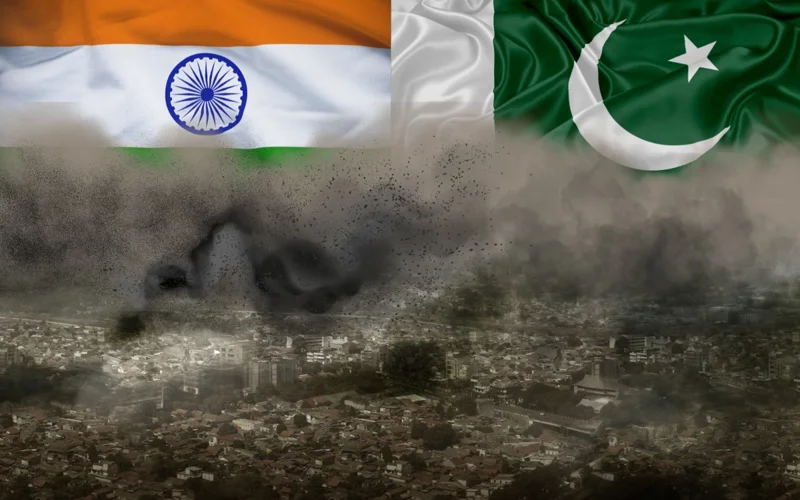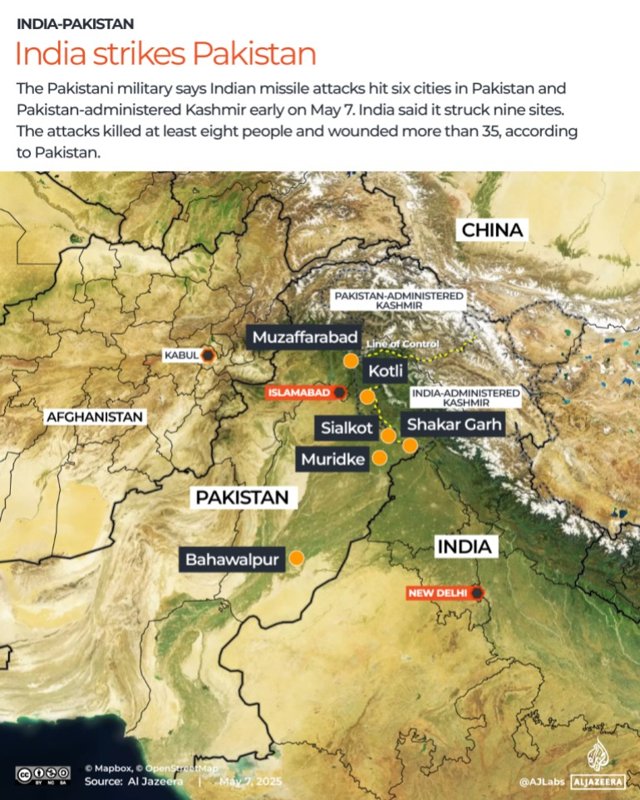India launches ‘Operation Sindoor’, Pakistan responds with counterstrikes
India launched a series of airstrikes on targets located in Pakistan and Pakistan-administered regions as part of Operation Sindoor, which began in the early hours of May 7. New Delhi claims the strikes were aimed at terrorist infrastructure, while Islamabad has reported civilian casualties and a military response, Kazinform News Agency reports.

In an official statement, the Indian Ministry of Defence said the operation targeted “terrorist infrastructure in Pakistan and Pakistan-occupied Jammu and Kashmir from where terrorist attacks against India have been planned and directed.” A total of nine sites were reportedly struck.
“Our actions have been focused, measured, and non-escalatory in nature,” the statement reads. “No Pakistani military facilities have been targeted. India has demonstrated considerable restraint in the selection of targets and the method of execution.”
The strikes come in response to last month’s Pahalgam terror attack, which left 26 people dead, 25 Indian citizens and one Nepali national. “We are living up to the commitment that those responsible for this attack will be held accountable,” the ministry said.
India’s External Affairs Minister Dr. S. Jaishankar posted a photo of the operation on X, writing: “The world must show zero tolerance for terrorism.”
The world must show zero tolerance for terrorism. #OperationSindoor pic.twitter.com/dmcCLfbMjN
— Dr. S. Jaishankar (@DrSJaishankar) May 7, 2025
According to Al Jazeera, Indian strikes hit multiple locations in Pakistan’s Punjab province: Ahmedpur Sharqia (near Bahawalpur), Muridke, a village near Sialkot, and Shakargarh. The deadliest strike occurred in Ahmedpur Sharqia, where a mosque compound was hit, killing at least five people, including a three-year-old girl. In Pakistan-administered Kashmir, Indian attacks also struck Muzaffarabad and Kotli, destroying two mosques and killing a 16-year-old girl and an 18-year-old boy.

Prime Minister of Pakistan, Shehbaz Sharif, condemned India’s strikes in a statement posted on X: “The cunning enemy has carried out cowardly attacks on five locations in Pakistan. Pakistan has every right to respond forcefully to this act of war imposed by India, and a forceful response is being given.”
مکار دشمن نے پاکستان کے پانچ مقامات پر بزدلانہ حملہ کیا ہے.
— Shehbaz Sharif (@CMShehbaz) May 6, 2025
پاکستان بھارت کی مسلط کردہ اس جنگی عمل کا بھرپور جواب دینے کا پورا حق رکھتا ہے اور بھرپور جواب دیا جا رہا ہے.
پوری قوم افواج پاکستان کے ساتھ ہے اور پوری پاکستانی قوم کا مورال اور جذبہ بلند ہے.
پاکستانی قوم اور افواج…
Following the initial strikes, Indian Foreign Secretary Vikram Misri said the investigation into the Pahalgam terror attack had uncovered operational links between the attackers and terrorist networks based in Pakistan.
“Investigations into the Pahalgam terror attack have brought out the communication nodes of terrorists in and to Pakistan. The claims made by The Resistance Front and their reposting by known social media handles of the Lashkar-e-Taiba speak for themselves,” said Misri addressing the press during the organized briefing.
He went on to detail intelligence findings that supported New Delhi’s case for targeted strikes.
“Identification of the attackers, based on eyewitness accounts as well as other information available to law enforcement agencies, has also progressed. Our intelligence has developed an accurate picture of the planners and backers of this team. The features of this attack also tie in with Pakistan's long-standing record of perpetrating cross-border attacks on India, which is well documented and beyond question,” the secretary stated.
Misri concluded by saying that India’s military action was a justified and restrained response aimed at preventing further attacks.
“Earlier this morning, as you would be aware, India exercised its right to respond and pre-empt as well as deter more such cross-border attacks. These actions were measured, non-escalatory, proportionate, and responsible. They focused on dismantling the terrorist infrastructure and disabling terrorists likely to be sent across to India,” he emphasized.
As of now, Pakistan reports that 26 people have been killed and 46 injured in the Indian airstrikes. On the Indian side, officials say at least eight civilians have been killed due to cross-border shelling from Pakistan. In Indian-administered Kashmir, at least ten more people have been reported dead from Pakistani artillery fire.
The international community has reacted and reached out to both sides of the conflict, urging de-escalation. Qatar’s Prime Minister Sheikh Mohammed bin Abdulrahman bin Jassim Al Thani held a phone call with Indian Foreign Minister Subrahmanyam Jaishankar, expressing Doha’s deep concern over the rising conflict and reaffirming Qatar’s commitment to peaceful dialogue.
The United Kingdom also offered their support, as UK Trade Secretary Jonathan Reynolds told BBC Radio: “We stand ready to support both countries. (...) Both have a huge interest in regional stability, in dialogue, in de-escalation and anything we can do to support that, we are here and willing to do.”
Qatar and the United Arab Emirates supported calls for restraint and emphasized the need for diplomatic solutions. Meanwhile, Turkey condemned India’s attacks, calling them “provocative” and calling for all parties to act responsibly and expressed hope that steps would be taken to reduce tensions as soon as possible.
Earlier, Kazinform reported on the positions of India and Pakistan, sharing official statements from both countries’ embassies in Kazakhstan outlining their stances on the incident and its broader consequences.

